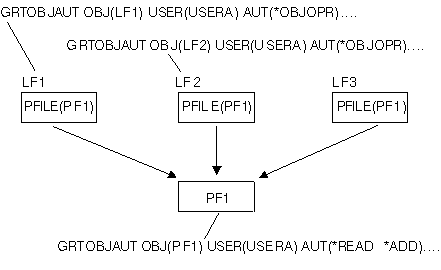Listed here are the types of data authorities, or permissions, to grant users access to physical and logical files.
Read authority
Users can read the records in the file.
Add authority
Users can add new records to the file.
Update authority
Users can update existing records. (To read a record for update, you must also have read authority.)
Delete authority
Users can delete existing records. (To read a record for deletion, you must also have read authority.)
Execute authority
You can use execute authority to work with libraries and to start programs. For example, if you are changing a file associated with a trigger, you must have execute authority to the trigger program. If you do not have execute authority, the system will not start the trigger program.
Normally, the authority you have to the data in the file is not verified until you actually perform the input/output operation. However, the Open Query File (OPNQRYF) and Open Database File (OPNDBF) commands also verify data authority when the file is opened.
If object operational authority is not granted to a user for a file, the user cannot open the file.
